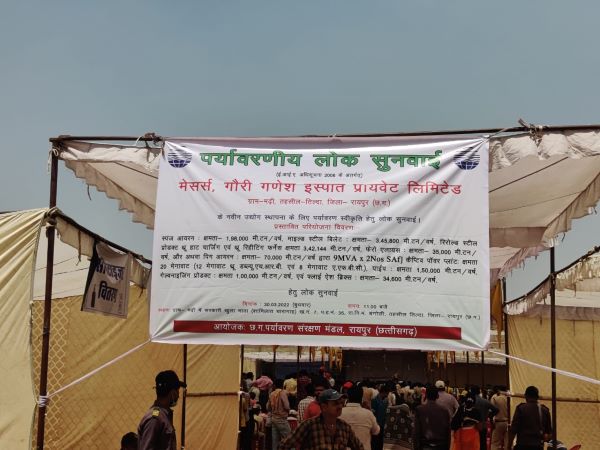
Team News Riveting
Raipur, March 30
Strong protest from the local villagers marred the public hearing convened in Tilda tehsil for setting up a new sponge iron unit by Gauri Ganesh Ispat Private Limited (GGIPP), a Raipur-Chhattisgarh-based company incorporated just 10 months ago.
The proceedings conducted by Chhattisgarh Environment Conservation Board (CECB) reportedly ended abruptly in an hour even as scores of people were lined up to lodge their protest.
The company has proposed to set up a 198,000 tonne per annum (TPA) sponge iron unit with 12-Mw captive power plant to feed it in Madhi village under Tilda tehsil of Raipur district. Besides, the GGIPP’s proposed plan includes new manufacturing facilities for MS Billets, Steel Reroll ed products, Ferro Alloys or Pig Iron; MS Black pipe mill; Galvanizing unit and Fly Ash products along with captive power generation plant comprising of Waste Heat Recovery Boilers (WHRB) and Atmospheric Fluidized Bed Combustion (AFBC) Boiler along with Steam Turbine and Generator.
According to the Environment Impact Assessment (EIA) submitted by the company for green clearance, it required 8.93 hectares of land to play with; of which 33.16 per cent or 8.93 hectares is under greenbelt and plantation.
Environment activist and Chhattisgarh Bachao Andolan (CBA) convenor Alok Shukla said in the periphery of 10 km, 70.68 per cent land had been of agriculture use while in 58.38 per cent land, farmers were taking double crops. “The public hearing conducted today was a clear violation of EIA notification, 2006 as the villagers were neither aware of any such proceedings nor were distributed the report in the local dialect as mandated,” Shukla said.
The CBA has submitted a written complaint demanding cancellation of public hearing as it failed to fulfil the notified norms. The project falls under Category “A”; Project Activity ‘3(a)’ Metallurgical Industries and 1(d) Thermal Power Plant that pose a serious threat to the environment.
Shukla said the water bodies in the periphery would challenge the livelihood of the local villagers while the road transportation of raw and finished materials would severely pollute the environment.



